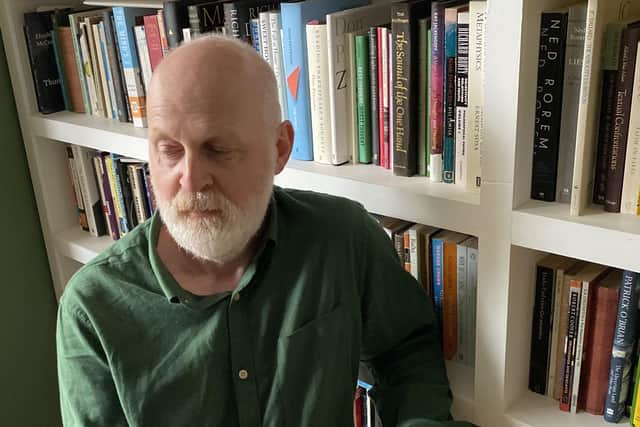Book review: Toy Fights: A Boyhood, by Don Paterson
Don Paterson is a liar. At the ingenious opening of his memoir, entitled “Pre Face”, he claims that he “started this book a good while ago – I think it was originally commissioned by TS Eliot – but stopped almost immediately, having spent the advance on a guitar”. Paterson was born in Dundee in 1963, and Eliot died in 1965, but note the qualifying “I think”. So Eliot was either preternaturally prescient, or communicated from an afterlife in which Paterson does not believe. More worryingly, it would be proof that Eliot had visited Dundee. To his credit, Paterson ’fesses up in the acknowledgements that it was, indeed, a barefaced lie. But it was a funny one, and the deft deployment of humour is typical of this book.
It is rare to read an autobiography which balances acerbic, almost visceral, anger with moments of genuine tenderness and affection. It covers the first 20 years of his life, so a reader gleaning some insight into “how to become a poet” might be disappointed, although when Paterson writes about the technical aspects of music – even the technological aspects of different speakers, guitars and plectrums – there is a sense of great respect towards craft, of the necessity of knowing your stuff.
Advertisement
Hide AdThe opening reminded me, surprisingly, of the opening of GK Chesterton’s Autobiography, given that their world views might hardly be more polarised. Here is Chesterton: “Bowing down in blind credulity, as is my custom, before mere authority and the tradition of elders, superstitiously swallowing a story I could not test at the time by experiment or private judgment, I am firmly of opinion that I was born on 29 of May, 1874, on Campden Hill, Kensington”. This is Paterson’s similar riff: “I recall nothing of my being born in Dundee Royal Infirmary in 1963. Which, of course, doesn’t mean it didn’t happen, but the possibility must remain that I may not have been”. The opening of Toy Fights also outlines Paterson’s key philosophy, defining reality as “that to which there appears to be no alternative”. Only, it transpires, there is.


This is frequently laugh out loud comedic, particularly when Paterson is describing his school years. His fellow pupils resemble some awful hybrid of the Bash Street Kids and the cast of Trainspotting (rather appositely, his father worked as a colourist at DC Thomson, and so his striped jumpers on Dennis the Menace must have reached a far greater readership than Paterson’s honed poetry). He is sardonic at his bemusement about school, writing that while “still a foetus in a blazer” he was “not convinced anyone properly explained to me what school actually was. I thought it was something we were trying out, like a new kind of cereal”. The tone is cleverly nuanced, with a patina of adult self-awareness over the real, or reconstructed, memories. It does not shirk from the simple sadism of some teachers, or the lives cut short by lack of opportunity, care and income. He is typically witty and resentful about Scottish confectionary, although the laugh comes with an upper-cut: for example, he comments on a friend’s observation that tablet comes in similar packaging to drugs in the Bronx. But this is extended into full-on polemic.
“Obesity, diabetes, docility and death are the object of the exercise, which is why governments are loath to cut sugar tax. Sure, diabetes costs the NHS, but nowhere near as much as longevity. And if the plebs stop thinking about sugar, fat and booze, they might start thinking about other things, like why austerity only ever seems to apply to them”. We can all play the sweetie nostalgia card, but I can remember my late brother détourning a popular jingle in the late 70s and singing “Opal Fruits, made to give you mouth ulcers”.
What makes this stratospherically better than most childhood memoirs is the searing anger about injustice that burns through the book. Paterson is an equal opportunities radical, in that he is equally irate at both the left and the right, and indeed some of his comments on the “woke culture” will no doubt draw sniffy disapproval from some; although I think Paterson is more than capable of dealing with that. (In an exchange with a student over David Hume, where he asks “do you know who he was?” and is told “I don’t care”, he goes thermonuclear: “fear not!... you are still safe saying whatever the f*** you like about women and the poor.”)
The most moving part of the book is a very frank account of a breakdown in his late teens. It is compelling, because despite the fogginess of such a state, Paterson remembers details – sometimes absurd, sometimes tragic – with a terrible clarity. Finishing the book, I wondered whether I would prefer Paterson to write more memoirs, poetry, aphorisms or criticism, and to be honest, I do not have a preference. In whatever genre, for an avowed and self-confessed fibber, there is an adamantine truthfulness in his work, vastly hard-won and radically different from the candy-floss bad faith that characterises so much that ends up printed between covers.
Toy Fights: A Boyhood, by Don Paterson, Faber & Faber, £16.99.